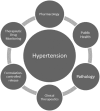Integrating science and practice in pharmacy curricula
- PMID: 24761024
- PMCID: PMC3996395
- DOI: 10.5688/ajpe78363
Integrating science and practice in pharmacy curricula
Abstract
An integrated curriculum is one where the summation of different academic disciplines forms a coherent whole and, importantly, where the relationships between the different disciplines have been carefully and strategically considered when forming the composite. Within pharmacy curriculum integration is important in order to produce graduates who have the capacity to apply their knowledge to a range of complex problems where available information is often incomplete. This paper discusses the development of an integrated curriculum in which students are presented with an organized, logical sequence of material, but still challenged to make their own integrations and develop as integrative thinkers. An evidence-based model upon which an interdisciplinary undergraduate pharmacy curriculum can be built is presented.
Keywords: assessment; curriculum; integrated curriculum; pharmacy education.
Figures
References
-
- General Pharmaceutical Council. Future Pharmacists Standards for the Initial Education and Training of Pharmacists. London: General Pharmaceutical Council; 2011.
-
- Irby DMP, Cooke MMD, O'Brien BCP. Calls for reform of medical education by the carnegie foundation for the advancement of teaching: 1910 and 2010. Acad Med. 2010;85(2):220–227. - PubMed
-
- Harden RM, Sowden S, Dunn WR. Educational strategies in curriculum development: the SPICES model. Med Educ. 1984;18(4):284–297. - PubMed
-
- Bandaranayake RC. The Integrated Medical Curriculum. London: Radcliffe Publishing; 2011.
-
- Henry NB. The integration of educational experiences. Chicago: University of Chicago Press; 1958.
MeSH terms
LinkOut - more resources
Full Text Sources
Other Literature Sources




